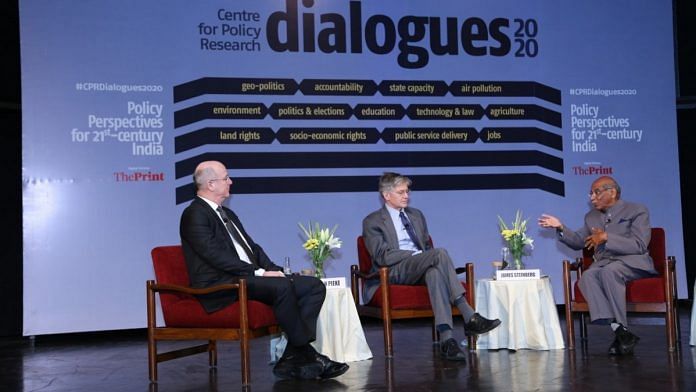New Delhi: Countries like the US, China and Japan are increasingly using globalisation, trade and interdependence as tools to settle issues between themselves and serve their own interest. But these are not beneficial in the long run, experts at the CPR Dialogues said Monday.
“We know what President Trump wants now in terms of trade deals. We are now seeing a number of them … So on one hand, while the President clearly favours bilateral trade deals … On the other hand, he is satisfied with non-systematic reforms … I do feel strongly that the cost of this is this weaponisation of trade, which (I) think is a short-term advantage… over time you lose it,” said James Steinberg, professor at Maxwell School of Citizenship and Public Affairs and the former United States Deputy Secretary of State.
On India & US
In terms of how India and the US settle their issues, Steinberg said it may be better for New Delhi to remove tariffs on Harley-Davidson bikes instead of trying other alternatives that could end up being “fundamentally disruptive”.
He also dismissed fears over India losing the US Congress’ bipartisan support it has always enjoyed.
“There are obviously different views in the United States about some of the very challenging issues that are being faced here with respect to Kashmir and the Citizenship arrangements. But, I think Americans have a sense of a deeper set of issues … There is a sense that relationship is bigger than the policies,” Steinberg said at the CPR Dialogues session ‘At the Threshold of a New Decade: Navigating the Emerging Geopolitical Landscape’.
He said while India and the US did show progress in the areas of convergence, such as counter-terrorism and rise of China, during President Donald Trump’s visit last week, both countries did not address the “need for an approach which allows for greater global cooperation”.
Also read: There is an asymmetry at the heart of India’s complex engagement with the world
‘Weaponisation of trade’
Frank N. Pieke, professor of Modern China Studies at Leiden University who was part of the session, said countries have been resorting to a “weaponisation of trade” to serve their own interests and said it was “deplorable”.
“Globalisation and trade and interdependence are now weapons, are tools to fight out conflicts between great powers. So the whole debate has moved from globalisation, which is deplorable … And so now you don’t deal with it but start living with this new reality,” he said at the session moderated by former diplomat Shyam Saran.
Countries are using this interdependence to serve their strategic enemies, Pieke said, adding that in Europe this thought has not yet sunk in.
ThePrint is a digital partner of the CPR Dialogues.
Also read: US-Taliban deal was like watching ‘Pakeezah’ after a long wait, says Jaishankar
ThePrint.in is the digital partner for CPR Dialogues. Read this series of curtain-raiser articles ahead of the conference.



